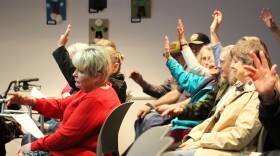The small Russian Old Believer Village of Kachemak-Selo — located down an 800-foot switchback at the head of Kachemak Bay — has been waiting more than a decade for an upgrade to its school facility.
The school is spread across three buildings, all with low ceilings, uneven floors and other structural issues. It currently serves about 30 students.The Kenai Peninsula Borough School District says the difficulty of accessing the community has limited maintenance there in the past. Recently, one of those three buildings was condemned, and is no longer in use.
Twelve years ago, the K-Selo community petitioned the district to build an entirely new school. It considered options other than rebuilding, including constructing a gondola so that students could be transported to another school, but those were deemed not to be viable.
In 2016, the district was awarded a $10 million grant from the state’s Department of Education and Early Development, or DEED, on the condition that it could put up a $5 million match. Two years later, borough voters rejected a bond that would finance that match.
The borough then sought a seven-year extension to put together the funding, which expires this July.
Borough Mayor Peter Micciche, previously a state Senator, represented the Kenai Peninsula during most of the K-Selo saga. He alluded to the longevity of the issue during a Kenai Peninsula Borough Assembly meeting this week.
“I know one family who are attending K-Selo at the other location whose parents were dealing with this issue,” Micciche said.
On Tuesday, the assembly approved his resolution that asks the legislature to move that $10 million from DEED to a different agency — the Department of Commerce, Community and Economic Development.
“We need to build a school for the community of K-Selo, and the only way that we see a viable path is through a Commerce grant. We’re simply requesting through resolution that the legislature shift that DEED grant to a Commerce grant so that we can afford to build a respectable school for the people of K-Selo,” Micciche said.
Moving the money to the Department of Commerce will remove that local match requirement and eliminate other design standards. Instead, the borough will focus on building a community center that’s used for educational purposes, rather than just a school.
John Hedges, the borough’s purchasing and contracting director, said the cost of building the school has escalated over the last decade, and the chosen site for the school turned out to not be viable. With the grant moved to the commerce department, he said, it will be easier to work with those constraints.
“What this process will do, by shifting the funds, is allow us to approach that program development from an architectural standpoint that will look at all of the priorities that we’d like to see in the facility,” he said.
Whether the facility will be owned by the district, or owned by the community and leased to the school, hasn’t yet been decided. But Micciche said the transfer is critical either way.
“The bottom line is we can’t build it for the money we have, and if it’s under commerce we can. I met with the superintendent and said we’ll figure out what works for the district, we’ll figure out what works for the kids,” he said. “But the bottom line is when you hit the decade mark, it’s too long.”
District Superintendent Clayton Holland said the idea for the transfer came up suddenly, but he’s grateful the borough is paying attention to the K-Selo issue.
“I’m really glad to hear the acknowledgement of that, and the recognition that we have to do something, that we can’t leave our kids in a situation like that,” Holland said. “And so if this is a means to that end, then I’m supportive and I believe the board is supportive as well. We just hope that we’re not left in a position where if this doesn’t get approved, the whole K-Selo project drops.”
He said his priority is just getting a school built for K-Selo.
The assembly passed the resolution unanimously as part of its consent agenda Tuesday night.







